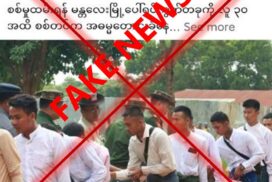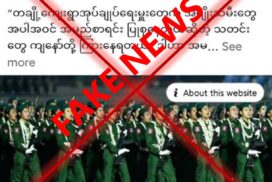Different conscription laws across the globe enable nations to assemble defence forces in order to safeguard their national sovereignty. The amount that will be matched is typically verified in cases where this practice is required for his country. The true essence of enacting such conscription laws, however, is to raise awareness of the following points: every citizen is duty-bound to defend their country, they must serve in the military if needed, and they must acquire the necessary skills for national defence. The State’s spending budget, the political and security landscape, and the methods and quantity of selection and verification for enlistment.
This article aims to elucidate the details surrounding military service laws that are governed by foreign nations worldwide and the necessity of Myanmar’s People’s Military Service Law. When looking at military service laws governed by foreign nations generally, two types of laws can be identified: Mandatory conscription combinations, which require men and women to serve in the military unconditionally and combinations system which exercises both the de jure system and the voluntary military service system.
The mandatory conscription system, which entails requiring eligible male and female citizens to serve in the military based on age and health requirements, is typically implemented in small, one-party states with sparse populations. Certain nations mandate that all citizens are required to register for military service; however, the de jure or combinations model is only available to those who voluntarily choose to serve and those who are required to serve.
During the world wars, the liberal democratic United States implemented a conscription system. Today, known as Selective Service, it is a mandatory registration system for military service that is put into place when a citizen turns 18 years old. Put differently, we can refer to it as the combinations model.
Neighbouring countries like Thailand have been using conscription systems. In addition, Laos and India have applied a voluntary service system, but they have enacted laws allowing them to call up their citizens if necessary.
One could say that China employs a de jure or combinations model like the United States. Russia, a powerful nation, has passed and put into effect laws requiring military service. Several countries in the region, including South Korea, North Korea, Singapore, Vietnam, and Cambodia, have passed and implemented laws requiring military service. The de jure model has also been used in Indonesia. According to the World Population Review website, 86 nations have enacted and implemented various forms of military service laws.
Since gaining independence on 4 January 1948, only voluntary enlistment has been practised in Myanmar. But after all this time, people have come to believe that the military handles national defence and that it is not their responsibility. However, it should be mentioned that the majority of armed insurgent groups recruit new members forcibly on the basis of ethnicity.
It is true that each and every citizen bears responsibility for the defence of their country. Every citizen is obligated to serve in the nation’s official armed forces if needed, a principle that has been stated by national leader General Aung San since 1947.
Every citizen must possess a strong understanding of national defence issues. Given Myanmar’s strategic location among powerful nations and its strategic position spanning South and Southeast Asia, all citizens ought to be aware of national defence issues.
From this, I learned that the People’s Military Service Law enforcement in Myanmar, which came into force on 10 February 2024, is an excellent procedure that needs to be carried out regularly for the sake of national security. Although it was enacted in November 2010, this law has come into force now. All citizens will not be required to serve in the military even if the People’s Military Service Law is enforced. Rather, a restricted quantity will be needed to be served. The officials state that no man or woman who is eligible for military service in Myanmar will be required to enlist at the same time. To reduce the burden on the state, only a small number of individuals within the designated age range will be identified and called up. Therefore, only eligible men will be chosen; calling up women has not yet been planned. All individuals chosen for military service will also get the same ration, pay, and allowances as other military personnel.
The People’s Military Service Law went into effect recently, and the government of Myanmar has only recently begun recruiting military personnel formally. But since Myanmar regained its independence, insurgents and ethnic armed groups have been forcibly recruiting people. The KIA insurgent group has been accusing people in Kachin State and the northern Sagaing region of being at fault for a variety of reasons in recent times. As a result, the victims have been made to join the KIA group as punishment. They enforce it on new recruits by family and by village. Similar to KIA, MNDAA and TNLA groups also extort huge sums of money from residents who choose not to join them. Young people in the Palaung region have recently fled the hands of the aforementioned groups, who are forcing the IDPs to join them, despite the fact that children and monks are being asked to forgo wearing religious-ordered clothing.
In Rakhine State, the armed insurgent group AA is forcing ten people to enlist from each village. Those who decline to join the insurgents are expelled from the village by the rebels. So do the armed groups of Wa group, Mongla group, Wang Hai group, Yawd Serk’s group, NMSP group, and KNU group. The entire populace hates PDF terrorists because they murder people and claim to be “informant/Dalan” if they do not join them. It is surprising to learn that certain nations and organizations condemn the application of laws enacted by independent states on the grounds of necessity and the actions of a government that complies with the law while ignoring the coerced enlistment of armed insurgents who are not authorized by law.
Every law-abiding young person does not need to serve in combat battalions or units under the People’s Military Service Law; instead, they can select other corps, as their assignments will be based on their skill sets. The fact that the chosen youths will serve in the designated battalions or units and that other citizens will have the opportunity to observe the People’s Military Service system makes me believe that the said law should be enforced. Those details will undoubtedly be included as soon as the pertinent bylaws are formally published.
Therefore, it is necessary for people not to pay attention and believe the false information spread by terrorists and insurgents. They fear that the citizens will enrol in lawful military service and study national defence education.
The People’s Military Service Law allows responsible young people to serve in the military with honour, allowing them to stand tall in their community. Improvement of self-control, enhancement of current skills, and increased maturity during military
from page -10
service will increase self-assurance, perseverance and physical fitness.
The knowledge and experience that come from serving in the military will help the young people in their future endeavours, and they will also develop the mental toughness necessary to overcome obstacles in the workforce.
Since the majority of people or communities will proportionately serve in the military, it is also crucial that mutual trust and understanding be developed between the civilian and military communities. For this reason, conscription programmes are known across the globe as the “Civil-Military Social Bridge,” connecting the civilian and military communities. With regard to the People’s Military Service Law, Myanmar’s existence and sovereignty can be ensured because a greater number of its citizens will be aware of defence and security. Therefore, the harsh criticism of Myanmar’s Military Service Law from certain nations that are attempting to destroy Myanmar through all means is indicative of their true goals.
In actuality, the People’s Military Service Law is being exercised in both the powerful nations of the world and the neighbouring countries, as well as in numerous other countries in the region. After serving in the armed forces for the required amount of time, young men and women can think rationally, have a disciplined system, be willing to work with others, develop high personal capability, and increase trust and understanding of Tatmadaw.
Overall, in the midst of global power competition, the People’s Military Service Law, passed in 2010, came into force on 10 February 2024. This was made possible by the need for a strong defence, harmonious integration with the People’s Militia Strategy, the growth of the people’s spirit for the Union and patriotism, and the chance for every citizen to fulfil their obligation to defend their country.
The People’s Military Service Law, which went into force in Myanmar, is not comparable to forced recruitment tactics used by terrorists and insurgents, nor is it comparable to some foreign countries’ Mandatory Conscription, which requires all men and women to serve in the military without exception.
I write this article to explain that the aforementioned law is a type of de jure or combinations that mandate that only a sufficient number of people serve in the military in accordance with the security and defence needs of their own nation.
Why does Myanmar need the People’s Military Service Law?
- March 22, 2024
- 274














